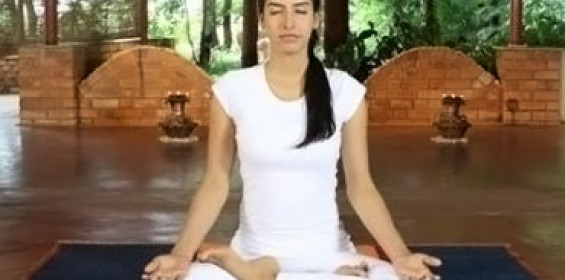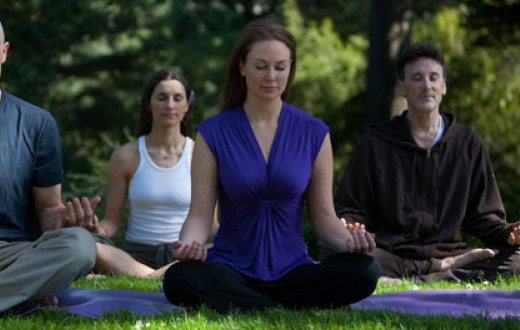Lying down in bed, tossing from one side to the other, waiting for sleep? Wondering if there could be a way to effortlessly sleep better?
Well, there is a simple secret to peaceful sleep. Include the practice of meditation in your life and see things turning around!
But before this, it would be a good idea to identify the cause of poor sleep. It could be anything, from stress due to overwork, illness, diet, poor sleep habits, emotional distress, or simply sensitivity to noise.
In case of stress or fatigue, meditation allows the body and mind to become quiet, reducing the effect of stress and giving deep rest to the mind and body.
A healthy response to stress is usually self-regulation, but when we are constantly alert, the stress hormones—adrenalin and cortisol—wreak havoc with our mental and physical processes, thus disrupting our sleep. Regular meditation significantly lowers these stress hormones, and the effect is maintained for hours.
If the problem is hard to identify because your mind is just too busy, meditation can help slow the mind and bring the underlying problems to light. The more we explore meditation, the more it becomes apparent that the practice is much more than just a tool to prevent sleepless nights, as meditaiton and sleep are closely related.
Intuitive awareness is a gift of regular meditation practice. There may be many things going on in the mind; gradually, and in the safe environment of meditation, the impressions of the mind are revealed. It can be used as a means for self-reflection, and we can identify the reasons for disturbed sleep easily.
Something to ponder upon...
#1 What are your sleeping habits? Are you keeping a regular sleep schedule? Are you sleeping during the day? What is the quality of your sleep? How long is the duration of your sleep?
Going to bed at the same time every night and waking up at the same time in the morning helps you get in sync with your body’s natural sleep/wake cycle. Most people need to sleep around 6-8 hours. So, set your body clock with a regular bedtime and try to maintain a regular wake-up time as well. Sleeping in the day can make insomnia worse, so try and avoid it; but if you must, keep it brief.
Did you know that just 20 minutes of meditation can give you as much deep rest as 8 hours of sleep? Well, try it out for yourself regularly and feel the difference. Not only will you feel fresh as a daisy after those 20 minutes of sitting with eyes closed, but you will also feel an improvement in the quality of your sleep at night.
#2 Are you overworking? Are you getting enough exercise? Is the problem physical or mental fatigue? Is the problem emotional? Are you able to relax, or is entertainment your relaxation?
Whatever the reasons for lost sleep, meditation and relaxation are the keys to balancing your energy. A little time spent in meditation not only makes up for lost sleep but also conserves your energy. Your "awake time" is more relaxed and your quality of "sleep time" also improves. Learning to relax and let go is the meditative way to move from a poor night’s sleep to a good night’s sleep.
To make a significant difference to your lifestyle, meditation is best practiced regularly. Ideally, try and meditate on an empty stomach first thing in the morning after bath; also meditate before lunch and before dinner.
#3 Is that late-night snack affecting your sleep? Can you manage your eating times so that you are not having your evening meal late? What kind of food are you consuming?
You may have to adjust your mealtimes, particularly your evening meals. The digestive system also has a natural rhythm, which slows in the evening. Eating late puts pressure on the digestive system and kicks the body into overdrive at the time it wants to rest.
Avoid stimulating food and drink; consume light and easily digestible sattvic food in the evening. Milk, butter, fruits, vegetables, and grains are gentle on the system and sleep-friendly. Know more about what food is good for you.
Where to Begin?
Meditation techniques are best learned from an experienced teacher. However, there are natural sleep remedies available for self-practice as well.
#1 Breath Awareness
A good way to begin is with simple breath awareness. Take time to gently observe the flow of your breath. While sitting or lying down, observe the incoming and the outgoing breath carefully; follow your breath as it enters the body and as it leaves, gradually extending both your inhalation and exhalation in a comfortable rhythm. Observe the effect on your mind and emotions. Learn to let go and be in the space that you create with the breath.
The breath has a powerful effect on all bodily systems. Learning to be aware of the various systems of the body as well as the mind and emotions and balancing all of the inner systems, is the basis of stress-management. Using the breath to relax the mind releases the buildup of tension and slows the thought process, giving a pacifying and harmonizing effect, inducing sleep.
#2 Guided Meditations
Guided meditations are an easy option. There is a wide range available, covering a range of topics. No matter what subject grabs your interest, guided meditations can expand your horizon and relieve your nervous system. They can be done on a daily basis or as an emergency measure in case of high stress. Would you like to meditate now?
#3 Yogic Sleep
Yoga Nidra (Yogic Sleep) can help bridge the gap between a wakeful mind and sleep. This is a simple process where you gently take your attention to various parts of the body, one by one, becoming aware of what is happening. By systematically relaxing your body using the breath in a gentle and specific way, your whole system can be brought to a state of relaxation. This is a very nourishing, calming state and can be used as a step to sleep.
#4 Mantra Meditation
Mantra meditation is another effective way to peaceful sleep. The Sahaj Samadhi Meditation Course is the best way to learn mantra meditation, where you are given a mantra by the teacher and all you need to do is to use your mantra. With the use of the mantra, you can effortlessly go into meditation. Would you like to do the course?
Inspired by Gurudev Sri Sri Ravi Shankar's wisdom talks
Written by Marylin Moon
Based on inputs by Bharathy Harish


































